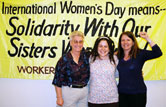Women’s history month commemorated
By
B. Sandburg
San Francisco
Published Mar 30, 2005 10:12 AM
Women’s central
role in the struggle against imperialism was celebrated at an International
Women’s History Month meeting in San Francisco on March 26, organized by
Workers World Party.
|
From left to right: Judy Greenspan,
Ruth Vela, Sharon Black.
|
Ruth Vela, a youth organizer with Fight Imperialism,
Stand Together—FIST—descri bed the battle women on the U.S.-Mexico
border are waging against maquil a doras—foreign-owned assembly plants
that pay poverty wages to workers, most of them young single women. Workers
World Party member Judy Greenspan spoke about the fight women wage behind prison
walls and the history of women in the lesbian/gay/bi/transgender movement.
Sharon Black, the Baltimore/D.C. coordinator of the Million Worker March, paid
tribute to women’s leadership in labor struggles.
Vela talked about
the horrific conditions women face in border towns. They earn $25 to $55 per
week working in assembly plants. The maquiladoras prefer to hire women who are
single; those who become pregnant are fired or assigned to difficult jobs to
force them to quit, she said.
Vela spoke about the terror women in Ciudad
Juarez face. Nearly 300 young women have been brutally tortured, raped and
murdered, and more than 4,000 women are missing.
“Despite these
staggering numbers the maquiladoras refuse to take any action in providing safe
transport to and from work for their employees, many of whom are forced to walk
dark unpaved streets late at night or in the early morning in order to reach the
shantytowns they live in,” Vela said.
Vela also discussed the battle
being waged by residents in Maclovio Rojas, a community outside Tijuana. They
are fighting to access the water that runs underneath the land they live
on.
While the Mexican government provides free water to foreign-owned
factories, it is demanding that the residents pay for it. So the people tapped
into the city’s main electrical lines, the main source of water. Officials
responded by going after those leading the struggle, including Nicolasa Ramos, a
woman in her 50s. She has now served almost two-and-a-half years behind bars for
alleged water theft.
Black said women face greater exploitation now
compared to the time her mother worked at Woolworth’s. Wal-Mart is a prime
example, she said. Seventy percent of the company’s workers are women who
are paid $7 to $8 an hour.
“You can’t separate women’s
struggle for liberation from the struggle against capitalism,” Black said.
“You can’t divorce what is happening at Wal-Mart from our Iraqi
brothers and sisters resisting U.S. war and occupation.”
Black said
the Million Worker March movement is now calling for reviving another crucial
day: May Day, the historic day honoring workers struggles around the
world.
Greenspan spoke about often forgotten fighters in the struggle for
justice: women in jails and detention centers, including immigration centers. In
1970 the women in Youth Against War and Fascism, the youth arm of Workers World
Party helped to revive International Women’s Day in the U.S. with a march
to the Women’s House of Detention in New York City.
A reporter from
KPFA, a progressive radio station, interviewed Greenspan before the meeting.
Greenspan told the reporter: “This meeting is for everyone in the struggle
against U.S. imperialism, those struggling for land and water like the people of
Uruguay who voted to end the privatization of water. We want to honor and
commemorate and prepare ourselves to struggle alongside our sisters in Pales
tine, Iraq, Iran and in this country.”
Articles copyright 1995-2012 Workers World.
Verbatim copying and distribution of this entire article is permitted in any medium without royalty provided this notice is preserved.
Workers World, 55 W. 17 St., NY, NY 10011
Email:
[email protected]
Subscribe
[email protected]
Support independent news
DONATE


